
Sep 217 Facts About Hunger and Homelessness You Should Know
As the weather starts to cool and the season changes to fall, we are very aware that the challenges that 2020 have presented will impact people with low incomes at a far greater rate than other populations.
Looking forward to National Hunger & Homelessness Awareness Week (November 15-22, 2020), we present the following 7 facts about hunger and homelessness, as well as steps you can take to help.
More than 54 million Americans may have experience food insecurity in 2020.
Food insecurity affects every county and congressional district in the country, according to Feeding America. Learn more about food insecurity (and food banks) in your community by exploring data from Feeding America’s interactive map.
Source: Feeding America

18 million children are experiencing food insecurity
Children from families struggling with hunger are more likely to repeat a grade in elementary school, experience developmental impairments, and have more social and behavioral problems, according to Feeding America, a nonprofit that addresses hunger in the U.S.
Source: Feeding America
Rural communities have higher rates of hunger than metropolitan communities (16.5% compared to 13.5%).
As Feeding America notes, hunger is more prevalent in rural areas for a variety of reasons, including but not limited to higher unemployment and underemployment rates, lower levels of education, and less access to work support services, such as flexible and affordable child care and public transportation.
Source: Food Research & Action Center,

Being homeless could take up to 30 years off your life.
Homeless people have an average life expectancy of 50 years of age, while most people can expect to live to 78. This short life expectancy is tragic but not necessarily surprising, given that people who are homeless are more likely to get sick, struggle with mental health and/or substance abuse, and are often victims of violence.
Every year on the longest night of the year, cities nationwide mourn the loss of people who died on the street in their communities.
Source: National Coalition for the Homeless

You could fill five football stadiums with the homeless population of the U.S.
At least 567,715 people were homeless on a given night in January of 2019 in the U.S., according to the Department of Housing and Urban Development’s (HUD) annual Point-in-Time (PIT) 2019 count.
While the PIT count does not fully capture the state of homelessness in the country, it offers an important snapshot that helps direct resources.
Source: The U.S. Department of Housing and Urban Development.
Photo credit: “Homeless and cold” by Flickr user Ed Yourdon

Every year 2.5 million children experience homelessness. That’s almost the entire population of Chicago.
One in every 30 children experiences homelessness every year in the U.S. Children are homeless in every city and state nationwide.
Source: American Institutes For Research
Anyone could be at risk of homelessness.
While hundreds of thousands struggle with homelessness, millions more are living paycheck to paycheck and at risk of becoming homeless. One unexpected event, like a car breaking down, can put them on the street.
Source: National Alliance to End Homelessness
How you can help
If you want to address hunger and homelessness in your communities, you can:
Volunteer your time and effort to homeless shelters, food banks, and affordable housing organizations in your area. Find volunteer opportunities with Mercy Housing here.
Donate money to organizations that are helping address hunger and homelessness.
Advocate for more affordable housing. The National Low Income Housing Coalition has a wonderful Advocates’ Guide to help get you started!
No related posts.
Stay Up To Date
Get news on Mercy Housing and inspiring stories of change delivered to your inbox.


